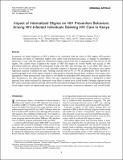| dc.contributor.author | Kingori, Caroline | |
| dc.contributor.author | Reece, Michael | |
| dc.contributor.author | Obeng, Samuel | |
| dc.contributor.author | Murray, Maresa | |
| dc.contributor.author | Shacham, Enbal | |
| dc.contributor.author | Dodge, Brian | |
| dc.contributor.author | Akach, Emannuel | |
| dc.contributor.author | Ngatia, Peter | |
| dc.contributor.author | Ojakaa, David | |
| dc.date.accessioned | 2021-08-27T19:16:06Z | |
| dc.date.available | 2021-08-27T19:16:06Z | |
| dc.date.issued | 10/31/2012 | |
| dc.identifier.citation | Kingori C, Reece M, Obeng S, Murray M, Shacham E, Dodge B, Akach E, Ngatia P, Ojakaa D. Impact of internalized stigma on HIV prevention behaviors among HIV-infected individuals seeking HIV care in Kenya. AIDS Patient Care STDS. 2012 Dec;26(12):761-8. doi: 10.1089/apc.2012.0258. Epub 2012 Oct 31. PMID: 23113743. | en_US |
| dc.identifier.other | PMID: 23113743 | |
| dc.identifier.uri | http://repository.amref.org/handle/123456789/173 | |
| dc.description.abstract | In general, an initial diagnosis of HIV is likely to be correlated with the onset of HIV stigma. HIV-positive individuals are likely to internalize stigma, may suffer from psychosocial issues, or engage in maladaptive behaviors to cope with the diagnosis. Internalized stigma stems from fear of stigmatization also known as felt stigma. The current study examined the impact of HIV felt stigma on overall health and success of HIV prevention behaviors among 370 participants living with HIV and receiving care at an urban HIV clinic in Kenya. An 18-item instrument was cross culturally adapted to measure felt stigma. Descriptive and logistic regression analyses examined the data. Findings indicate that 25.9% (n=96) of participants who reported experiencing high levels of felt stigma related to other people's attitudes toward their condition, ostracizing, and a disruption of their personal life, were likely to not adhere to prescribed HIV medication and not disclose their HIV serostatus to one other person. Those who also experienced felt stigma related to a disruption of their personal lives while mediated by depression were likely to report poor overall health. Findings support having HIV clinics and interventions develop relevant HIV prevention strategies that focus on the emerging dimensions of felt stigma which can significantly impact disclosure of serostatus, medication adherence, and overall health. | en_US |
| dc.description.sponsorship | School of Health, Physical Education, and Recreation, Department of Applied Health Science Indiana University. | en_US |
| dc.language.iso | en | en_US |
| dc.publisher | Mary Ann Liebert, Inc. | en_US |
| dc.subject | Stigma | en_US |
| dc.subject | Kenya | en_US |
| dc.subject | Serostatus | en_US |
| dc.subject | Depression | en_US |
| dc.subject | Voluntary testing and counseling (VCT) | en_US |
| dc.subject | HIV/AIDS | en_US |
| dc.subject | Antiretroviral therapy (ART) | en_US |
| dc.subject | Mother-to-child transmission of HIV (PMTCT) | en_US |
| dc.title | Impact of Internalized Stigma on HIV Prevention Behaviors Among HIV-Infected Individuals Seeking HIV Care in Kenya | en_US |
| dc.type | Article, Journal | en_US |

